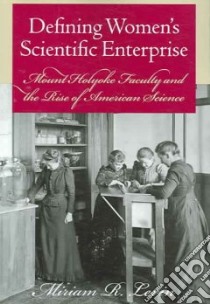Defining Women's Scientific Enterprise - 9781584655541
Un libro in lingua di Levin Miriam R. edito da Univ Pr of New England, 2006
- € 20.40
- Il prezzo è variabile in funzione del cambio della valuta d’origine
This fascinating reappraisal of the relationship of women and the scientific enterprise focuses on the efforts of Protestant women science faculty at Mount Holyoke College to advance themselves and their institution from its founding as an evangelical Protestant seminary for women by Mary Lyon in 1837 to the present. Contrary to most history-of-science interpretations of women's professional experience, Levin suggests that in several important ways New England Protestant culture -- and the zeal of women faculty at a college established to train female missionaries -- created a learning environment that enabled science faculty to establish and maintain a niche for themselves and to contribute to the development of scientific enterprise, particularly during Mount Holyoke's first hundred years.
Levin's study reflects the paradigm shift in writing about science inspired by the publication of Thomas Kuhn's book The Structure of Scientific Revolutions (1962), which transformed the history of science from its exclusive focus on scientific discoveries about how nature operates to a field that pays much more attention to the social roots of scientific discoveries. Historians of science now routinely consider both "external" as well as "internal" developments in the co-production of science.
Levin examines science at Mount Holyoke College in four critical "externalist" dimensions: religion, gender, geography, and pedagogy. She shows how the unique blending of a religious and female calling took place in a particular geographical setting -- a relatively isolated college town in New England. She also shows how new ideas about "doing science" became translated into new ways of teaching science and how pedagogy and scientific discoveries are mutually interactive.
Ultimately, Levin presents an intriguing case study of an alternative way of doing science -- college-based, women-based, religion-based, teaching-based -- one wholly different from the "rise of the research university" model that has become the basis for the history of academic science in the United States. In Levin's book, Mount Holyoke itself becomes an experiment that raises a basic question: Is there another way to do science?
Informazioni bibliografiche
- Titolo del Libro in lingua: Defining Women's Scientific Enterprise
- Sottotitolo: Mount Holyoke Faculty And the Rise of American Science
- Lingua: English
- Autore: Levin Miriam R.
- Editore: Univ Pr of New England
- Collana: Univ Pr of New England (Paperback)
- Data di Pubblicazione: 01 Marzo '06
- Genere: SOCIAL SCIENCE
- Pagine: 209
- Dimensioni mm: 228 x 152 x 25
- ISBN-10: 1584655542
- EAN-13: 9781584655541


